The ecommerce market is booming, and it is predicted that the retail ecommerce revenue will reach $1,145.7 billion by 2029 in the United States alone. Read on to learn more and choose the best ecommerce tools to establish and grow a successful online store.
What Are the Tools of Ecommerce?
To make your ecommerce business both profitable and appealing to customers, it is important to implement the best tools for ecommerce. These tools are designed to boost revenue and grow your business online.
In this article, we will cover the following types of ecommerce tools:
- Ecommerce platforms
- Analytics
- Customer service
- AI tools
- Automation
Continue reading to learn more about these key ecommerce instruments that can significantly enhance your online business.
Create your ecommerce system with SaM Solutions – and enjoy easy maintenance, longer customer dwell time, and an increased conversion rate.
Best Ecommerce Platforms
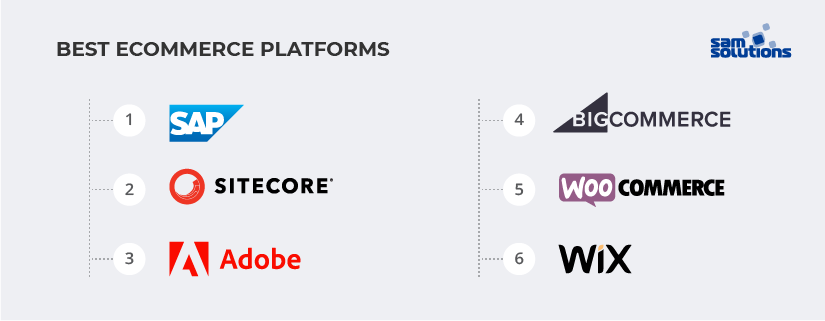
1. SAP Commerce Cloud
SAP Commerce Cloud is a popular solution for omnichannel commerce featuring enhanced order management and effective marketing. This reliable and scalable tool helps large businesses improve their customer experience and boost conversions.
Key Features
- Product content management
- One-to-one customer engagement
- Maximized ROI on personalization
- Plug-and-play integration
- B2B self-service tools
Pricing
- SAP doesn’t publicly release its pricing information for SAP Commerce Cloud. The exact sum is available upon request.
Pros
- Scalability
- Robust functionality
- Personalization and microservices
Cons
- High cost
- Not suitable for small businesses and startups
Level
Large businesses
Clients
Microsoft, Nestle, Toyota
2. Sitecore
Sitecore Commerce enables business owners to develop customized shops for various specific products and services.
Key Features
- Cloud-native Digital Experience Platform (DXP)
- Proven ROI
- Brilliant digital experiences
- Sitecore Experience Accelerator (SXA)
- Personalization and analytics
Pricing
- Available upon request
Pros
- Scalability
- High security
Cons
- Expensive
Level
Sitecore Commerce is most suitable for large companies
Clients
Lane Bryant, Papa Jones, jonastone
3. Adobe Commerce (Magento)
Magento is a powerful solution with extensive ecommerce features. It is often the choice for enterprise-level businesses that prioritize a detailed, customer-centric approach.
Key Features
- Headless commerce
- Multi-brand solution
- Integrated B2B functionality
- Powerful user experience
- Comprehensive management of catalogs, orders, and inventory
Pricing
- Available upon request
Pros
- Scalability
- Versatile built-in functionality
- SEO-friendly
- Large community support
Cons
- High cost
- Time-intensive development
- Complex customization
Level
Magento is best for large businesses
Clients
Coca-Cola, T-Mobile, Monin, Krispy Kreme, Helly Hansen
Request SaM Solutions’ ecommerce development services to grow your client base and boost profitability of your online sales.
4. BigCommerce
BigCommerce is a platform that allows merchants to create, upgrade, and expand their business online.
Key Features
- Full-featured online store
- Multi-currency support
- Inventory management
- Enterprise services
- Robust analytics
Pricing
- Standard — $29/month
- Plus — $79/month
- Pro — $299/month
- Enterprise — available upon request
Pros
- Comprehensive all-in-one solution
- Flexibility in store design and management
- High reliability and security
Cons
- Sales volume limits on each pricing plan
Level
Small, medium, large businesses
Clients
Gillette, Wholesale Marine, Wholetones
5. WooCommerce
WooCommerce is an open-source platform tailored for WordPress website owners. Although it is a free option, it offers robust ecommerce features.
Key Features
- Optimized checkout
- Multi-channel ecommerce
- Content marketing and SEO tools
- No-code customization
Pricing
- Free open-source platform
Pros
- Seamless integration with WordPress websites
- No coding skills required to get started
- A comprehensive suite of tools
Cons
- Advanced features require paid upgrades
Level
Best suited for small to medium businesses, particularly in the marketing and advertising sectors
Clients
Sodashi, Custom Seafood, Printing New York
6. Wix
Wix is a powerful, no-code website builder equipped with comprehensive business tools, enabling the creation of anything from a simple personal blog to a complex, enterprise-level website.
Key Features
- Drag-and-drop ecommerce website builder
- SEO and marketing tools
- Pre-made templates
- AI-powered website builder (Wix ADI)
- Mobile optimization
Pricing
Website plans
- VIP — $24.50/month
- Unlimited — $12.50/month
- Combo — $8.50/month
- Connect Domain — $4.50/month
Business and ecommerce plans
- Business VIP — $35/month
- Business Unlimited — $25/month
- Business Basic — $17/month
- Enterprise — available upon request
Pros
- User-friendly interface
- Affordable pricing
- Access to Wix app market
Cons
- Limited customization options
- Storage limitations
Level
Small and medium businesses, enterprises
Clients
Glassdoor, Vevo, Kroger, Bolt, Intuit
Best Ecommerce Analytics Tools
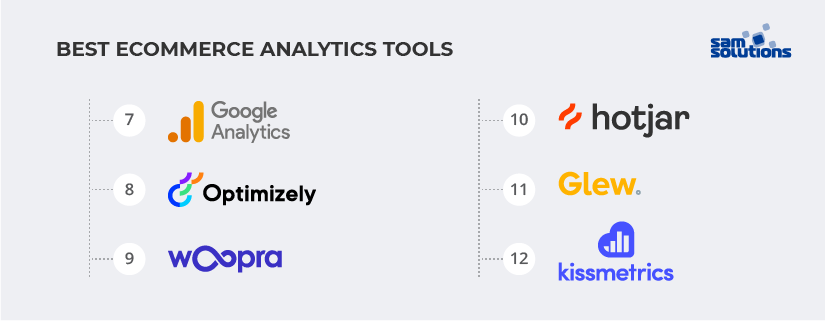
7. Google Analytics
Google Analytics, a component of the Google Marketing Platform, is a powerful web analytics service that provides insights and data about website traffic, user behavior, and other valuable metrics to optimize online presence.
Key Features
- User exploration
- Automation features
- Predictive analytics
- Proactive insights
- Real-time reporting
Pricing
- Free plan with just essential tools
- Custom plan, pricing available upon request
Pros
- Comprehensive data collection
- Seamless integration with other Google products
- User-friendly interface
Cons
- Data privacy concerns
Level
Small, medium businesses, enterprises
Clients
Uber, Spotify, Cisco
8. Optimizely
Optimizely is a digital experience platform used for evaluating and improving website performance.
Key Features
- Ecommerce campaign planning
- Content creation
- Team collaboration
- Experimentation and insights
Pricing
- Custom quoted
Pros
- Advanced A/B testing
- Educational support
Cons
- Limited use for smaller businesses
Level
Medium businesses, enterprises in retail, travel, and B2B high-tech fields
Clients
Lyft, IBM, American Express
9. Woopra
Woopra is a customer journey analytics platform that tracks and analyzes user behavior across various digital touchpoints, including websites, mobile apps, and help desks.
Key Features
- Real-time analytics
- Customer profiles
- Behavioral segmentation
- Automated actions
Pricing
- Core plan — free
- Pro — $999/month
- Enterprise — available upon request
Pros
- Generous free plan
- Integration with third-party tools
- Customization for targeted analysis
Cons
- Pricing can be considered relatively expensive for businesses with larger data volumes
Level
Small and medium businesses, enterprises
Clients
Mayvenn, Rentler, CloudApp
10. Hotjar
Hotjar is a website analytics tool that provides heatmaps, behavior analytics, and user feedback, helping businesses optimize their websites for better user experience and conversion rates.
Key Features
- User behavior visualization
- User recordings
- Conversion funnels
- Surveys
- Interviews
Pricing
- Basic — free
- Plus — €32/ month
- Business — €80/ month
- Scale — €171 / month
Pros
- Easy to set up and use
- Combines analysis and feedback functionality in a single software
Cons
- Feature-rich interface may be overwhelming for some users
Level
Businesses of all sizes, from small to large
Clients
Adobe, HelloFresh, HubSpot
11. Glew
Glew is a powerful, all-in-one ecommerce analytics tool designed to provide ecommerce merchants with valuable insights into their business performance.
Key Features
- Detailed CRM with individual customer profiles
- Data filtering and segmentation
- Automated reporting and dashboards
- Marketing analytics
- Alerts and automation
Pricing
- Available upon request
Pros
- Niche integrations
- User-friendly interface
- Cross-platform reporting
Cons
- Complex pricing structure
Level
Small and medium businesses, enterprises
Clients
Sunflower Digital, Blume, Omnycode
12. Kissmetrics
Kissmetrics is an ecommerce and SaaS analytics platform that enables businesses to track customer behavior, increase conversions, and optimize their marketing strategies.
Key Features
- Multi-channel attribution
- Data visualization
- Email automation
- Segmentation
- A/B testing
- Analytics
Pricing
- Silver — $199/month
- Gold — $499/month
- Platinum — Custom pricing
Pros
- Customizable metrics dashboard
- Niche integrations with leading ecommerce, operations, and marketing tools
Cons
- Steep learning curve for new users
Level
From small to medium-sized businesses, enterprises
Clients
Microsoft, Lucidchart, Merci Corps, Carvana
Ecommerce Customer Service Tools
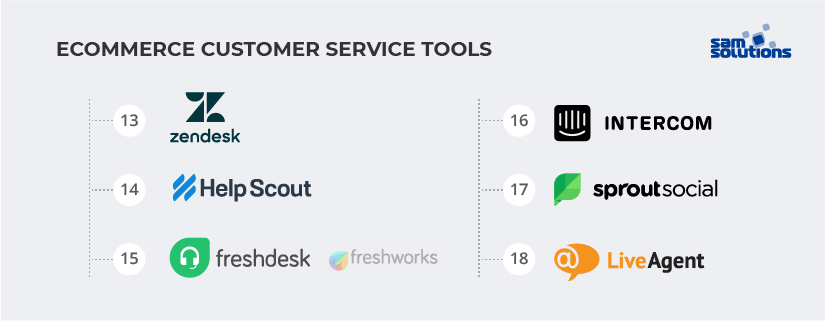
13. Zendesk
Zendesk provides software-as-a-service (SaaS) products that enhance customer support, sales, and customer communications.
Key Features
- Helpdesk
- Live сhat
- Sales CRM (Zendesk Sell)
- Custom CX (Zendesk Sunshine)
- Advanced reporting and analytics
- Ticketing system
Pricing
Suite plans
- Suite Team — $55 per agent/month
- Suite Growth — $89 per agent/month
- Suite Professional — $115 per agent/month
- Suite Enterprise — custom
Sales plans
- Sell Team — $19 per agent/month
- Sell Growth — $55 per agent/month
- Sell Professional — $115 per agent/month
Pros
- AI, chatbots, and conversion support
- Unified workspace
Cons
- Integration challenges
- Limited customization
Level
Small and medium-sized businesses, enterprises
Clients
The Home Depot, The Walt Disney Company, Tesla, Netflix, Siemens
14. Help Scout
Help Scout is a customer support software solution that simplifies managing customer communications for teams.
Key Features
- Single, unified platform for managing customer interactions
- Mobile apps for managing support tickets
- Omnichannel support
- Proactive messaging
- Live chat
Pricing
- Standard — $20/per user/per month
- Plus — $40/per user/per month
- Pro — $65/per user/per month
Pros
- SEO-friendly
- Access to 100+ app integrations
Cons
- Limited customization options
Level
Small and medium-sized businesses, enterprises
Clients
Buffer, Litmus, Mixmax
15. Freshdesk
Freshdesk is a cloud-based software developed by Freshworks that helps customer support teams streamline their operations.
Key Features
- Advanced ticketing
- Self-service options
- Reporting and analytics
- Automation features
- AI-driven insights
Pricing
- Free
- Growth — $15/month
- Pro — $49/month
- Enterprise — $79/month
Pros
- Centralized communication
- Multi-channel support
- Collaboration tools
Cons
- Initial setup may be complex for some users
Level
Small and medium-sized businesses, enterprises
Clients
Pearson, Decathlon, Orderin, Sonata
16. Intercom
Intercom is a software company that specializes in business messaging, helping companies engage with customers via direct chats.
Key Features
- Omnichannel support
- Workflow automation
- AI insights and reporting
- Outbound messaging
Pricing
- Essential — $39 per seat/month
- Advanced — $99 per seat/month
- Expert — $139 per seat/month
Pros
- Multiple help centers
- Custom objects and actions
Cons
- Limited features in lower-priced plans
Level
Small and medium-sized businesses, enterprises
Clients
Microsoft, Amazon, Meta
17. Sprout Social
Sprout Social is a social media management software designed for businesses to manage their social media presence.
Key Features
- Social media management
- Content scheduling
- Customer service integration
- AI and automation tools
- Analytics
Pricing
- Standard — $199 per seat/month
- Professional — $299 per seat/month
- Advanced — $399 per seat/month
- Enterprise — available upon request
Pros
- Team collaboration
Cons
- Potentially cost prohibitive for smaller businesses
Level
Small and medium-sized businesses, enterprises
Clients
UNICEF, HP, Campbell’s, Equifax
18. LiveAgent
LiveAgent is a help desk and customer support software that offers a range of features for businesses to manage their customer interactions and provide efficient support.
Key Features
- Ticketing system
- Live chat
- Call center
- Social media help desk
- Customer service reporting
Pricing
- Small business — $9/agent
- Medium business — $29/agent
- Large business — $49/agent
- Enterprise — $69/agent
Pros
- Supports multiple languages
- Gamification in customer service
- Mobile help desk apps
Cons
- Mobile app limitations
Level
Small and medium-sized businesses, enterprises
Clients
Airbus, Forbes, Slido, eSky
Ecommerce Automation Tools
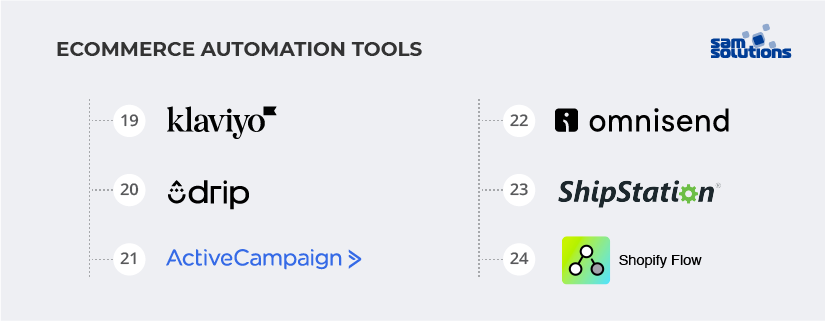
19. Klaviyo
Klaviyo is a global technology company that provides a marketing automation platform, primarily used for email marketing and SMS marketing.
Key Features
- Automated flows
- Template and campaign builder
- Segmentation
- Dashboards for reporting
- Integrations and APIs
Pricing
- Free option with limited features
- Email — starting at $45/month/1,001–1,500 contacts
- Email and SMS — starting at $60/month/1,001–1,500 contacts
Pros
- Cross-channel flows
- 300+ pre-built integrations
Cons
- Learning curve for users new to marketing automation
Level
Small and medium-sized businesses, enterprises
Clients
Roswell NYC, Code
20. Drip
Drip is a marketing automation platform primarily focused on serving the needs of ecommerce businesses.
Key Features
- Marketing automation
- Email design and scheduling
- Segmentation
- Analytics and insights
Pricing
- Custom — from $39/month/2,500 people on the mailing list
Pros
- Customer-centric marketing approach
- High email deliverability
Cons
- Learning curve for users new to marketing automation
Level
Small and medium-sized businesses, enterprises
Clients
The Spice House, Universal Audio, The Feed, Live Nation
21. ActiveCampaign
ActiveCampaign is a marketing automation and customer relationship management (CRM) platform.
Key Features
- Email marketing
- Dynamic content
- Customized landing pages
- Segmentation
- Sales CRM
- Analytics and reporting
Pricing
Marketing
- Lite — starts at $9/month
- Plus — starts at $49/month
- Professional — starts at $149/month
- Enterprise — starts at $259/month
Sales
- Plus — starts at $19/month
- Professional — starts at $49/month
- Enterprise — starts at $99/month
Bundles
- Plus — starts at $93/month
- Professional — starts at $386/month
- Enterprise — starts at $734/month
Transactional Email
- Available upon request
Pros
- Omnichannel marketing
- Integrated AI
Cons
- Complex pricing structure
Level
Small and medium-sized businesses, enterprises
Clients
Serato, Wonsulting, Biletto, Byrider, Roland
22. Omnisend
Omnisend is an omnichannel marketing automation platform that helps launch effective email campaigns. With this tool, business owners can create personalized messages based on customer data.
Key Features
- Marketing automation
- SMS messaging
- Push notifications
- Segmentation and customer analytics
- Email marketing
Pricing
- Free/250 contacts
- Standard — $16/month/500 contacts
- Pro — $59/month/2,500 contacts
Pros
- Multi-store accounts
- 130+ Integrations
- Migration tools
Cons
- Limited variety in templates
Level
Small and medium-sized businesses; marketing and advertising industry
Clients
Inglot, Amundsen, Snatcher
23. ShipStation
ShipStation is a comprehensive shipping and order fulfillment platform designed to help ecommerce businesses streamline their shipping processes, saving time and money on order fulfillment.
Key Features
- Order management system
- Inventory management
- Reports
- Branded shipping experience
Pricing
- ShippingEasy — Free
- Starter — $9.99/month
- Bronze — $29.99/month
- Silver — $59.99/month
- Gold — $99.99/month
- Platinum — $149.99/month
- Enterprise — $229.99/month
- High-volume — available per request
Pros
- Automation
- Customizable shipping
- Configurable tracking pages
Cons
- Some clients find the user interface unappealing
Level
Small and medium-sized businesses, enterprises
Clients
Synergy, Bell Honda, The Groomsman Suit
24. Shopify Flow
Shopify Flow is an ecommerce automation tool offered by Shopify that allows merchants to automate tasks and processes within their online stores and across various apps. It is available to businesses on the Basic, Shopify, Advanced, and Shopify Plus plans.
Key Features
- Workflow automation
- Store events monitoring
- Inventory management
- Fraud prevention
- Fulfillment management
Pricing
- Basic Shopify — $24/month
- Shopify — $69/month
- Advanced Shopify — $299/month
- Plus — $2,300/month
Pros
- Loyalty and retention
- Plug-and-play templates
- Shopify Payments and integrations with 100+ payment providers
Cons
- While user-friendly, optimizing the automation features in Shopify Flow may require some previous experience with such tools
Level
Small and medium-sized businesses, enterprises
Clients
Landyachtz Skateboards, Malvi
Top Ecommerce AI Tools
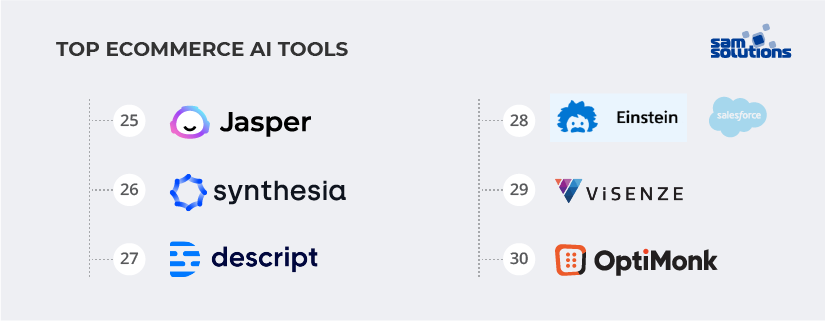
25. Jasper
Jasper is an artificial intelligence tool designed to assist ecommerce brands and retailers in creating engaging content, driving sales, and maintaining brand consistency.
Key Features
- Creating complete marketing campaigns
- Jasper brand voice
- Translation in 30+ languages
- AI art generator
- Built in privacy and secure access
Pricing
- Creator — $39 per month/seat
- Pro — $59 per month/seat
- Business — available per request
Pros
- Improved SEO performance
- Capable of generating high-quality, human-like content
Cons
- User interface could be improved
- Pricing can be expensive
Level
Small and medium-sized businesses, enterprises
Clients
Morningstar, Wayfair, Amplitude
26. Synthesia
Synthesia is an AI-powered video creation platform that allows users to generate professional-looking videos without the need for cameras, actors, or studios.
Key Features
- Video generation and editing
- Instant video translation
- Media library
- Live collaboration
- Reviews
Pricing
- Free
- Starter — $22/month
- Creator — $67/month
- Enterprise — custom pricing, available upon request
Pros
- 160+ diverse AI avatars
- 120+ languages and accents
- 60+ pre-designed video templates
Cons
- AI voices may sound computer-like
Level
Small and medium-sized businesses, enterprises
Clients
Microsoft, Zoom, Accenture, Reuters, Xerox
27. Descript
Descript is an innovative audio and video editing platform that leverages advanced artificial intelligence technology to simplify the process of editing audio and video files.
Key Features
- Video editing
- Podcasting
- Remote recording
- Clips
- Screen recording
- Transcription
Pricing
- Free
- Creator — $12 per user/month
- Pro — $24 per user/month
- Enterprise — custom pricing, available upon request
Pros
- Text-based editing
- Collaborative features
- Integrations
Cons
- Descript may lack some advanced features for professional video editors
Level
Small and medium-sized businesses, enterprises
Clients
Shopify, Stanford University, HubSpot, Headspace
28. SalesForce Einstein
Salesforce Einstein is an integrated set of AI technologies developed for the Salesforce platform. It is designed to enhance various aspects of customer interactions, sales processes, marketing strategies, and service delivery.
Key Features
- Predictive and generative AI for marketing, sales
- Efficient marketing campaigns
- Automated workflows
- Predictive lead scoring
- AI-powered analytics
Pricing
- Custom, depends on the chosen Salesforce plan and utilized services
Pros
- More personalized and impactful customer service experiences
- Enhanced decision-making
- Streamlined operations
Cons
- Steep learning curve
- Expensive
Level
Mostly enterprises and larger organizations
Clients
McKesson, General Mills, Mercedes-Benz Group, JPMorgan Chase
29. ViSenze
ViSenze is a smart search and product discovery platform that leverages artificial intelligence to enhance the shopping experience for retailers.
Key Features
- Advanced smart search tools
- AI-powered visual search
- Automated product recommendations
- Trends and performance metrics
- Deep conversion funnel analytics
- Easy A/B testing and preview functionality
Pricing
- Custom, different pricing options tailored to your business needs
Pros
- Blazing-fast performance
- Ease and speed of deployment with plug-&-play templates
- Configurability and optimization with no-code widgets
Cons
- May be a costly solution
Level
- Mostly enterprises and larger retailers
Clients
Rakuten, Kravet, Interpark, Snitch, UNIQLO
30. OptiMonk
OptiMonk is an ecommerce conversion optimization platform that helps businesses generate leads and increase sales through the use of personalized pop-ups and other on-site engagement tools.
Key Features
- Website personalization and pop-ups
- Advanced conversion booster features
- Targeting and triggering
- A/B testing
- Analytics
Pricing
- Free
- Essential — $39/month
- Growth — $99/month
- Premium — $249/month
- Master — custom, available upon request
Pros
- Gamification
- Wide range of templates and integration options
Cons
- Customization of templates may be tricky
Level
Primarily small and medium-sized businesses, particularly in the ecommerce space, and occasionally enterprises
Clients
Selzy, Vegetology, E2 Agency, Acer, Avon
Why SaM Solutions Is the Best Ecommerce Development Provider?
Choosing SaM Solutions for your ecommerce development needs means partnering with a recognized leader in the industry. Boasting over 30 years of experience and a dedication to long-term partnerships, we excel at delivering successful projects across multiple industries. Our deep expertise ensures we not only meet your technical needs but adapt to evolving market trends. We provide comprehensive support from initial consulting to post-deployment maintenance for a seamless project lifecycle.
We leverage top ecommerce tools and the most advanced technology platforms, such as SAP Commerce Cloud, Sitecore Experience Commerce, Adobe Commerce, and Salesforce Commerce Cloud, ensuring robust, scalable, and flexible ecommerce environments. Our capabilities range from rapidly deployable platform-based solutions to fully custom builds that address unique business challenges and goals.
SaM Solutions is not just a service provider — we are a partner dedicated to ensuring your ecommerce venture’s success. By choosing us, you leverage a team of seasoned experts who are committed to delivering cutting-edge solutions tailored to enhance your business performance and customer satisfaction. Let us help you transform your retail business into a thriving online success story.
Conclusion
With the right ecommerce tools, online sellers can build a user-friendly ecommerce store, streamline workflows, upgrade marketing strategy, and increase profits. For guidance on ecommerce development or to discover the best tools for your business, consult SaM Solutions. Our experienced engineers are ready to help you empower your business, innovate your offerings, and surpass your competitors.



















 The Latest 15 Information Technology Trends in 2024
The Latest 15 Information Technology Trends in 2024 Top 10 Embedded Software Development Tools
Top 10 Embedded Software Development Tools IaaS vs. PaaS vs. SaaS: What’s the Difference?
IaaS vs. PaaS vs. SaaS: What’s the Difference? 10 Examples of Predictive Analytics
10 Examples of Predictive Analytics









![What Is Ecommerce Customer Service? [Including 8 Best Practices]](https://www.sam-solutions.com/blog/wp-content/uploads/Customer-Service-in-eCommerce.png)


 Web App Development Cost in 2025 [Key Price Factors]
Web App Development Cost in 2025 [Key Price Factors] 13 Best React Development Tools in 2025
13 Best React Development Tools in 2025 Top 10 Mobile App Development Trends 2025
Top 10 Mobile App Development Trends 2025 Top IoT Industry Trends in 2025
Top IoT Industry Trends in 2025 Java Web App Security: Everything You Need to Know
Java Web App Security: Everything You Need to Know
Which one to choose: Magento, Shopify, BigCommerce? Perhaps you can give me advice on which one is the best for my medium-sized business? I haven’t chosen yet.
Thank you for providing a thorough comparison of the existing tools and features. I compared several options, and made my final choice with regards to price and the benefits it can bring.
I really enjoy using Sellbrite, as I am one of those merchants who prefer to sell their products on multiple marketplaces at the same time. I have been using it for quite a while, and I have never had any trouble with the tool, only positive feedback.
As I am constantly in search for new partners for manufacturing, I will gladly try Sourcify. I hope this tool will help me find new allies I can establish fruitful long-term cooperation with.
I haven’t decided yet which tool to try. I will reach out to you to make the final decision. I think it will be the best solution, as in this case I will get specific advice based on my individual needs.
I have read the entire article and I can now tell the difference between these tools. I compared all the pros and cons and have a few ideas in mind for how to implement these tools in my shop.
Thank you for the detailed analysis of all the advantages and disadvantages of these tools. I can use this information to choose the most suitable tools for my online business.